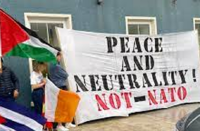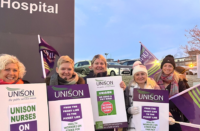Jointly hosted by the Trade Union Campaign to Repeal the 8th Amendment (TUCR8A) and the Coalition to Repeal the Eighth, this public meeting dealt with article 40.3.3 as a work-place, class, equality and human rights issue.
Like most trade union meetings, Repeal the 8th: The Role of Trade Unions started a little behind schedule. Organisers, speakers and audience members were chasing after each other to ask advice, cash in favours, and update each other—doing all the behind-the-scenes work that kicks campaigns off and keeps them afloat.
The meeting was well attended by trade union officials and activists as well as by non-union members.
The meeting was chaired by Ailbhe Smyth, convenor of the Coalition to Repeal the 8th Amendment, with her usual blend of humour and passion. Dr Fiona Bloomer and Claire Pierson opened the meeting by giving an overview of the ground-breaking survey “Abortion as a Workplace Issue: A Trade Union Survey North and South of Ireland.” This survey can be found on the web sites of the participating unions: Unite, Unison, Mandate, CWU, and GMB.
The survey is broken up into three main parts: Views on abortion—broken down by gender, age, religion, profession, and region; Abortion as a workplace issue—a range of scenarios related to disclosure, advice and support, time off, and sickness pay; and Qualitative responses—discussion groups and personal remarks.
Maggie Ryan, on behalf of the TUCR8A, spoke on the class aspects of access to abortion and how these link directly to trade union struggle, as well as precarious work, low pay, and the difficulties of obtaining leave, particularly for those precariously employed or in feminised professions, such as teaching and nursing. She spoke of the secrecy surrounding women’s health, and the fact that this needs to be addressed for real progress to be made. She held up a TUC publication, Supporting Working Women through the Menopause, and said, to much applause, that she looked forward to the day the ICTU could produce the same, along with one about abortion.
Emily Waszak brought a new perspective to the table. Speaking on behalf of a new campaign group, Migrant and Ethnic Minorities for Reproductive Justice, she pointed out the need for an intersectional approach—an approach that acknowledges class struggle but also how racial and ethnic discrimination overlap with it. She succinctly highlighted the fact that the “right to travel” is non-existent for women in direct provision and for the many migrants who do not have the means to prove their identity in order to travel.
A speaker from the British Trades Union Congress joined the panel to add an international flavour. Philipa Harvey of the National Union of Teachers mirrored the journey that twelve women from Ireland make every day to obtain access to abortion to offer solidarity and speak on the need to be prepared to fight to maintain access once repeal is won.
The respected community and reproductive rights activist Cathleen O’Neill further examined the 8th Amendment as a class issue and argued that it is a further erosion of the lot of working-class women. She emphasised the ground that had been lost for women and community supports during the recession and stressed that these need to be won back.
Drawing the many threads together, Mags O’Brien (ICTU Global Solidarity Committee) closed the meeting by referring to the hypocrisy of the Government and the rhetoric about Ireland’s commitment to human rights while women are still denied access to essential health services.






